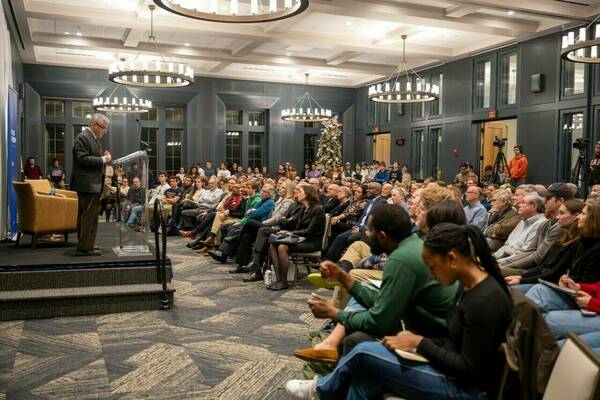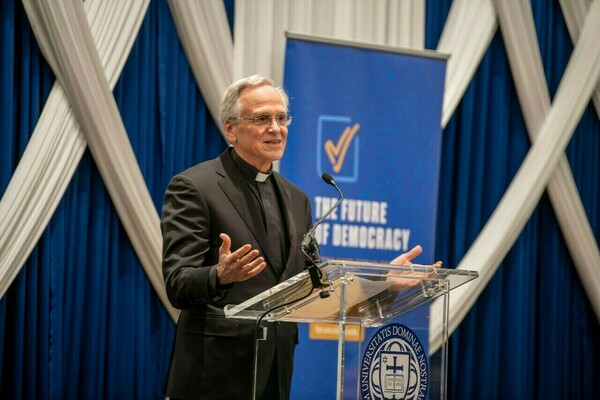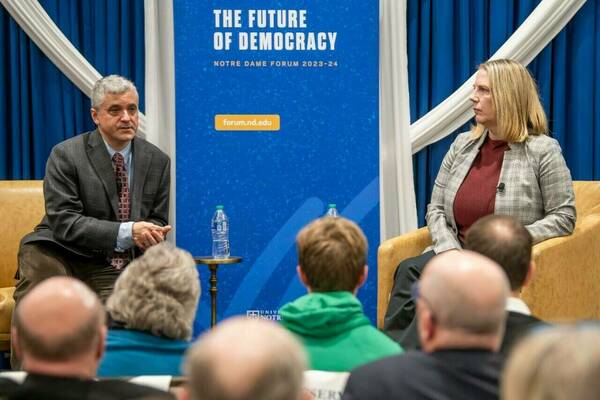
In front of a standing-room-only crowd of more than 300 people on Monday (Dec. 4), Harvard University professor and New York Times bestselling author Steve Levitsky delivered a passionate lecture that was part U.S. and world history and part future-state prediction, as he described how democracy in the United States — as well as democracies around the world — risk sliding into minority rule.
Levitsky is the co-author, with Daniel Ziblatt, of two bestselling books that explore this theme, “How Democracies Die” and “Tyranny of the Minority: Why American Democracy Reached the Breaking Point.”
The event was part of this year’s Notre Dame Forum on “The Future of Democracy.” University President Rev. John I. Jenkins, C.S.C., offered brief remarks at the start of the evening, noting that the Forum’s theme is designed “to foster respectful dialogue and reflections on the rising threats to democracy at home and abroad, and on how democracy can be reinvigorated to meet the challenges of our time.”

Levitsky opened his presentation by citing data from the nonprofit organization Freedom House’s global freedom index, which annually scores the strength of a country’s democracy from a low of zero to a high of 100. A decade ago, U.S. democracy received a score of 92 out of 100; today, that score is 83.
To understand the reason for this decline, Levitsky discussed the historic transition the U.S. has undergone over the past 50 years to become a multiracial democracy, a result of increased diversity in our population and in our political structures.
“The U.S. is undergoing an unprecedented transition, an historic transition — a transition to a multiracial democracy in which a previously dominant group loses its dominant status,” Levitsky said. “That, we argue, has triggered an authoritarian reaction among a minority of Americans.”
In addition, Levitsky argued, the situation is exacerbated by the U.S. Constitution. He argued that the Constitution inadvertently empowers this emerging authoritarian minority through the inclusion of mechanisms like the Senate, the Electoral College, or the lifetime appointment of Supreme Court justices, all structures that are not always representative of popular sentiments and allow overrepresentation for minority viewpoints.
In spite of these realities, Levitsky noted that individuals throughout U.S. history have worked to adapt systems in order to bolster democracy, and that these efforts have declined over the last 50 years.
“Back in 1787, George Washington wrote a letter to his nephew, in which he described the new constitution written two weeks earlier as an imperfect document, and said that it would be up to future generations to make it better,” Levitsky said. “And generations of Americans did just that: From the Bill of Rights to the important Reconstruction Amendments to the expansion of suffrage to Progressive Era reforms to the Civil Rights era, Americans worked to make our system more democratic.
“But over the last half century, we’ve stopped doing that work. We need to get back to that reformist tradition. And we need to put institutional reform back on the public agenda; we need to start discussing it. If we don’t, we risk a slide into minority rule.”
All these forces have brought the country to the precipice of what Levitsky considers a watershed 2024 presidential election that will set the tone for U.S. democracy into the future.
He emphasized the importance of U.S. citizens recommitting themselves to working to strengthen U.S. democracy, and offered some concrete recommendations for building a broad, bipartisan coalition to prevent democratic backsliding. Levitsky suggested that it might be time to consider putting Republicans on Democratic Party tickets in 2024, and finding other ways to set aside major policy differences for the sake of resisting partisan gridlock.
“That’s a big ask, but these are not ordinary times. If we behave as if we are in ordinary times we could lose our democracy,” Levitsky said. “We stand at a crossroads today. America will either be a multiracial democracy in the 21st century or it will not be a democracy. Both of those roads lie before us and there is no turning back.”

Following Levitsky’s remarks, Christina Wolbrecht, professor of political science and the C. Robert and Margaret Hanley Family Director of the Notre Dame Washington Program, moderated a discussion that included questions from those in attendance. Questions addressed wide-ranging topics including the role of the military in democratic systems, attempts to curtail voting rights and the impact of global politics on U.S. democratic structures.
The full presentation is available here.
Originally published by at news.nd.edu on December 07, 2023.